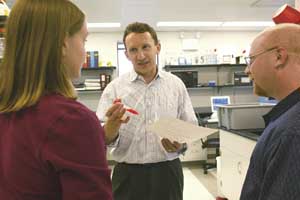2002 Quantrell Award Winner: Benjamin Glick, Associate Professor in Molecular Genetics & Cell Biology
By Catherine GianaroMedical Center Publc Affairs
 Benjamin Glick |
“At the undergraduate level, you bring students up to speed on what the current thinking is,” Glick said. “And later on, if they go on to focus in science, that’s when you start to learn that what’s in the textbook might be wrong.”
After earning a doctorate in 1988 from Stanford University, Glick worked as a postdoctoral researcher at the Biozentrum at the University of Basel, Switzerland, before joining the Chicago faculty in 1995.
“This field of science is changing very fast,” Glick said, which is why he devotes one lecture of his undergraduate course to a more graduate-level presentation.
“I give them an example of a topic that is still being very hotly debated in science, and I explain to them two different models that have been put forward and are still competing for acceptance.
“It gives them a feeling of what science is actually like, as opposed to the neat package story that they get in the textbook,” he said. “They seem to appreciate it.”
Since the course he teaches is an introductory class, Glick starts with a more general perspective of science. “You need to understand why this is interesting, why something is surprising or how it fits into the bigger picture,” he said. “Just memorizing the facts is dull.”
And like every teacher, he enjoys the positive feedback he gets from his students.
“Occasionally you have those who come up afterward and say ‘That was fantastic’ or ‘I really understand this now.’ ” And there have been others, Glick said, who were inspired enough to pursue studies in biology.
“I think the students here are excellent. It’s a pleasure to teach them. They’re a very serious group of students, and I enjoy communicating my excitement.”
As a cell biologist, that excitement stems from trying to understand how cells assemble themselves.
“Cells are like little machines,” he said. “The overall goal of a cell biologist is to try to understand this machine.
“Cells are made up of thousands of compartments. We’re trying to figure out what those components are, how they interact with each other, where they are located, and how they get to where they’re going.
“Just like a body has organs, each of which has a specialized function,” he said, “a cell contains internal structures called organelles, each with a specialized function.”
Glick focuses his research on one organelle in particular––the Golgi apparatus, which delivers other cell components to their destinations. With the help of six graduate students, Glick studies the function and mechanism of this multi-layered, sac-like structure found in most cells.
Teaching, said Glick, positively reinforces his own research. “Teaching forces you to think things through and to organize your thoughts,” Glick said. “It keeps me on my toes.”
![[Chronicle]](/images/small-header.gif)